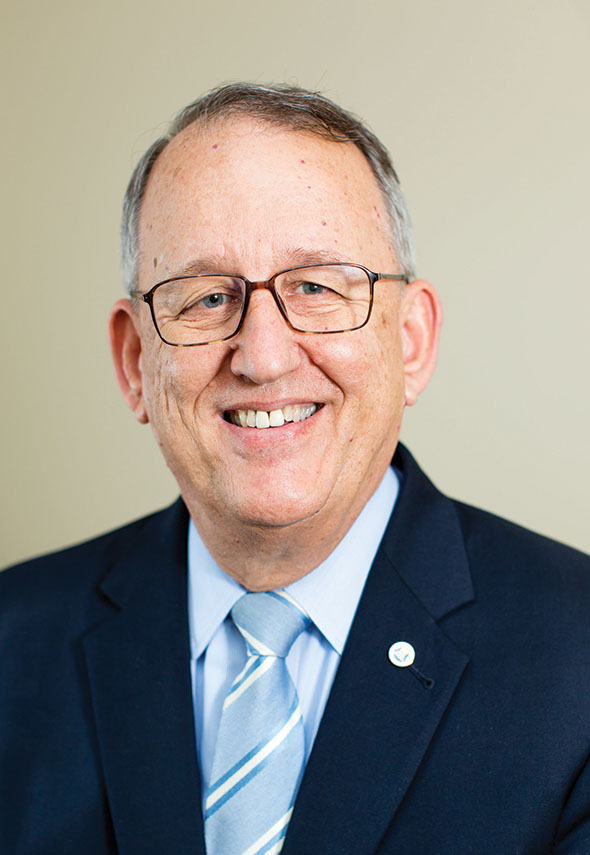“Unlike Any Other Year”
Posted on Jan. 14, 2021Readers of this column know that for some time, as we enter a new year, I’ve shared campus highlights from the previous year. Since mid-March, our University has been working hard to respond to COVID-19 while teaching the next generation of leaders; to discover solutions to the world’s greatest challenges; and to serve North Carolina, the United States and the world.

Douglas S. Dibbert ’70
A year ago, the Board of Trustees approved a new strategic plan — “Carolina Next: Innovations for Public Good.” The trustees also lifted the 2015 moratorium on renaming campus buildings and later approved the removal of Aycock and Ruffin from residence halls and Daniels and Carr from other buildings. Chancellor Kevin Guskiewicz formed the Commission on History, Race and A Way Forward.
Among the many whose passing we’ve mourned in the past year were:
• Longtime professor of medicine, associate dean of medical school admissions and associate dean for rural initiatives Dr. Robert Bashford ’71 (MD);
• Veteran N.C. state senator and longtime GAA volunteer leader Anthony Eden “Tony” Rand ’61 (’64 LLBJD);
• Former medical school dean and the first president of the UNC Health Care System Dr. Jeffrey L. Houpt;
• Distinguished writer and creative writing instructor Daphne Athas ’43;
• Accomplished and inspiring writer and professor Randall Kenan ’85; and
• Beloved former business school marketing professor Rollie Tillman ’55.
“For All Kind: The Campaign for Carolina” enjoys continuing success — $565 million in 2019–20 — and totals $3.47 billion, surpassing 79 percent of its ambitious $4.25 billion goal in 70 percent of the elapsed time.
Among many meaningful gifts in 2020 were $15 million from Jim Koman ’86 and his wife, Jennifer, to fund the Bill Koman ’56 “Game Plan for Success”; a $25 million commitment from Steve Bell ’67 and his wife, Jackie, and another $25 million anonymous gift to expand Kenan-Flagler’s undergraduate business program; from the Eddie ’65 and Jo Smith Foundation, the largest gift ever to athletics, to name the field at Kenan Stadium for Chris Smith ’87; three paintings, valued at $12.1 million, from Jane Roughton Kearns to the Ackland Art Museum; and a gift from Wanda and Roy Williams (both ’72) to fund scholarships for another year of eligibility for all spring-sport athletes.
After 22 years at Carolina, including seven trips to the College World Series, Mike Fox ’78 (’79 MAT) retired as Carolina’s winningest baseball coach, and after 39 years, Derek Galvin ’76 retired as Carolina’s gymnastics coach.
After 20 years at Carolina, widely respected Vice Provost for Enrollment and Undergraduate Admissions Stephen Farmer is returning to the University of Virginia as vice provost for enrollment.
In August, Peter Hans ’91 became president of the UNC System, and Amy Johnson became Carolina’s vice chancellor for student affairs.
In October, in virtual celebrations, UNC installed Kevin Guskiewicz as its 12th chancellor and marked University Day.
Undergraduate applications for admission increased to 47,607 — up 6 percent from the previous year and the 15th consecutive year in which applications have increased — and Carolina welcomed 5,303 new undergraduates, including 4,444 first-year students — the most ever.
Carolina’s rankings continued to be strong throughout the year. Notably, the Eshelman School of Pharmacy was again ranked the No. 1 school of pharmacy in the U.S., and Carolina was recognized as having the most COVID-19 research underway of any university in the world. New research awards reached an all-time record: $1.048 billion. Tressie McMillan Cottom from the School of Information and Library Science was chosen for a MacArthur Fellowship (also known as a “genius grant”) from the MacArthur Foundation.
After an expanded spring break to provide faculty the opportunity to pivot to remote instruction, students were given the option to take all courses pass/fail rather than for a letter grade. Sadly, there were no spring reunions, and the class of 2020 could only be recognized virtually, with Commencement speaker Frank Bruni ’86 providing a virtual message, as did Chancellor Guskiewicz and others.
Led by Kenan Distinguished Professor of epidemiology Ralph Baric, UNC researchers continue three decades of research on coronaviruses. They also continue to advise campus leaders about ensuring safety while teaching and conducting research during the pandemic.
The tragic killing of George Floyd prompted the Carolina community to reflect and take action on racial equity and inclusion.
Summer school sessions, delivered virtually, had the largest enrollment ever while Chancellor Guskiewicz’s leadership team developed a roadmap for the fall semester. The semester opened and proceeded with no spread of the virus in classrooms nor any spread in dining halls, libraries or research facilities, but unfortunately multiple clusters occurred after only a week of classes, necessitating a return to remote instruction. (As in the spring, students could appeal to remain on campus, and 1,500 of them — some from other countries, some who are married and some who are athletes — spent the semester in residence halls.)
The spring semester will include COVID testing for students, faculty and staff. Single-room occupancy will be provided on campus for up to 3,500 students with more space reserved for possible isolation and quarantine. Commencement 2021 is presently scheduled for May 16.
The previous paragraphs do not adequately convey how challenging the previous calendar year has been for students, staff, faculty, parents and the community, but it should help us appreciate how 2020 was “unlike any other year.”
Yours at Carolina,

Douglas S. Dibbert ’70
